The Best British Schools for Sport
By
1 year ago
Is finding the right independent school the key to an Olympic gold?
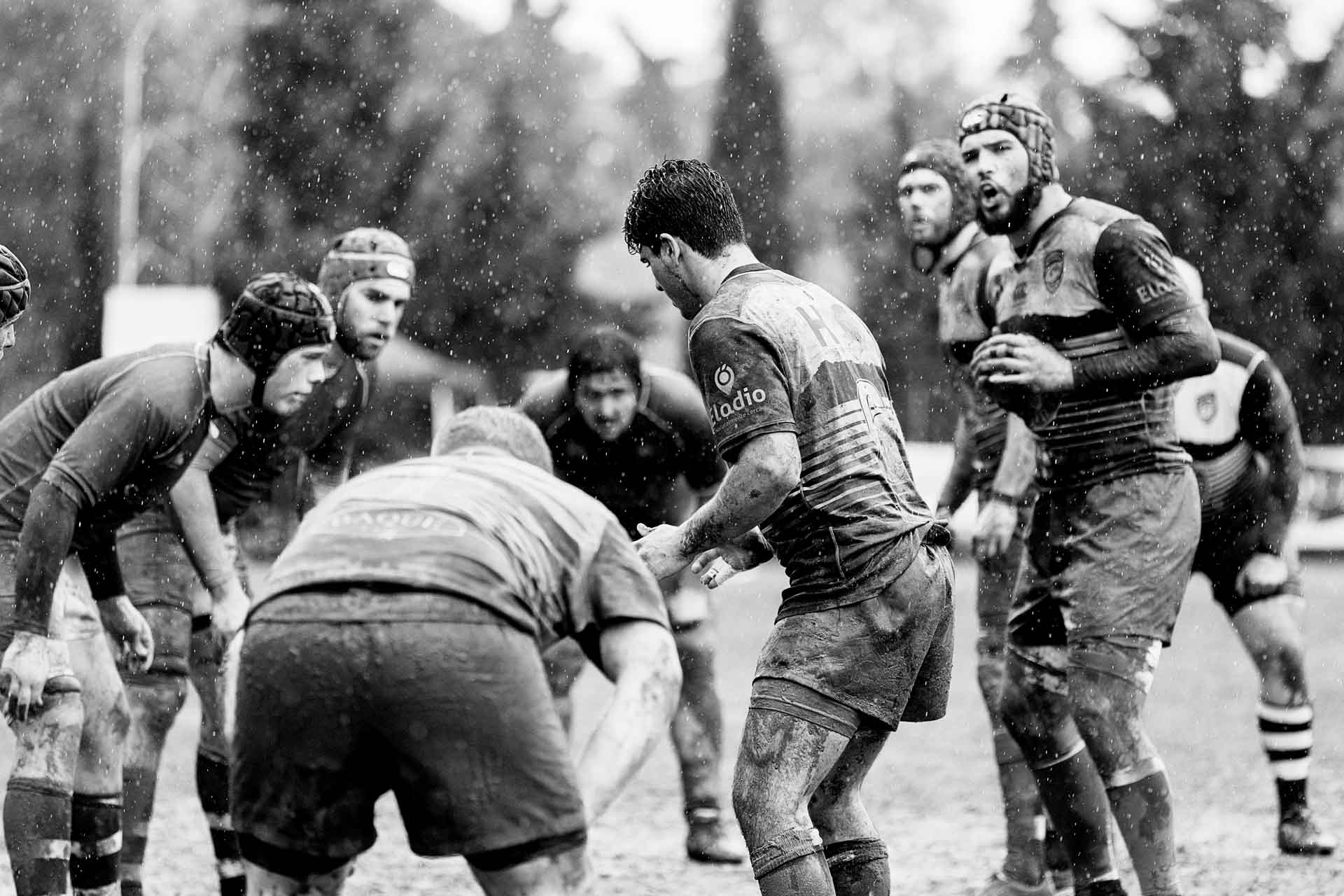
It is no coincidence that a third of Britain’s medallist in the last two Olympic Games were educated in independent schools, says TV sports presenter and sportswoman Sally Jones.
Millfield School
As a tennis-mad 13-year-old, I travelled to Street in Somerset with the Warwickshire junior county team to take on the might of Millfield School. With half the country’s top juniors in their squad, they were a formidable prospect. I am proud to say our defeat was a narrow one. But I was in love. I was astounded by their jaw-dropping facilities and coaching.
With its stunning grounds, huge swimming pool, polo fields, indoor tennis courts and acres of pitches, it was my idea of heaven – you could even take a pony. When I got home I sat down and wrote to the headmaster, begging to go there on a sports scholarship. He was encouraging and invited me down – but boringly suggested I let my parents know first. They pooh-poohed the idea.
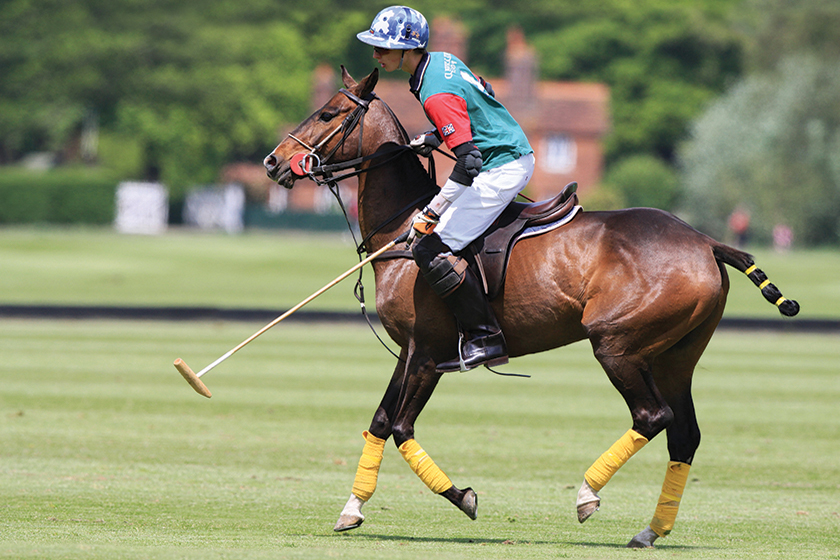
Millfield School
Decades later, Millfield is still a sporting powerhouse and although top tennis talent now tends to eschew formal education to train at specialist tennis camps overseas, the school turns out more sporting greats than ever, from England rugby captain Chris Robshaw (and several teammates) to former England netball captain Pamela Cookey.
Around 50 alumni achieve international selection every year in cricket, swimming, athletics, polo and modern pentathlon – you name it. Millfield’s nine competitors at the London’s Olympics included two gold medallists; rower Helen Glover in the women’s pair and Peter Wilson in the double trap shooting.
Millfield sides’ recent achievements include success in the European Schools Golf Championships, Twenty20 cricket, girls’ tennis, and cross country. Additionally, they have qualified swimmers for Olympic trials.
The Best Sport Schools in the World
Although Millfield is Britain’s best-known specialist sports school, many other private schools also produce stellar sporting talent. It is no coincidence that more than a third of Britain’s medal winners at the last two Olympic Games were from independent schools, which educate only seven per cent of all pupils.
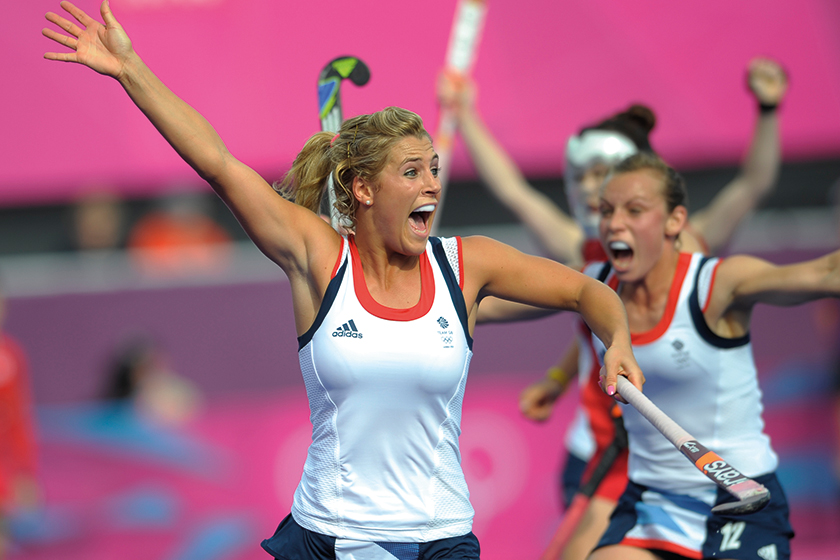
Repton School
Twenty members of the current England rugby squad attended private schools, as did more than 60 per cent of English players in the Rugby Union Premiership, and over half the current England cricket and hockey teams, both male and female. Old Reptonians alone make up five of the GB women’s hockey squad, including Olympian Georgie Twigg, and there are five Whitgiftians in the national Under 21 team.
Independent Sport Schools in England
Best School For Cricket
Brighton College is a pioneer of women’s cricket: record-breaking England wicket-keeper Sarah Taylor, who with fellow-alumnae Holly Colvin and current ECB women’s supremo Clare Connor, spearheaded the World Cup victory in 2009, has just achieved her 100th One-Day cap and became the first woman to play men’s grade cricket in Australia.
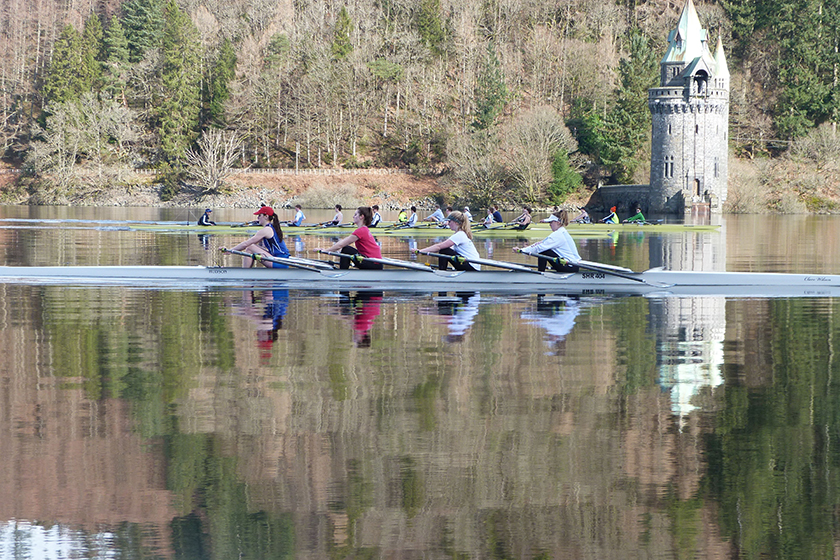
Shrewsbury School
Best Schools for Rowing in the UK
Rowing has always been dominated by a handful of schools, including Hampton, Eton, Shrewsbury, and Lady Eleanor Holles, Loretto School and Wellington slug it out with Millfield for top honours in golf, producing numerous outstanding amateur and professional players.
Best Rugby Schools in England
Wellington excels at rugby, along with Harrow, Warwick School, Whitgift, Tonbridge, Brighton, Bromsgrove and Sedbergh, which despite its size – just 320 boys in its co-ed senior school – fields 15 rugby teams during the season and has produced numerous rugby greats including England captains Wavell Wakefield, John Spencer and Will Carling, plus World Cup winner Will Greenwood. It is strong at rifle shooting, cross country, fell running and netball too: former England netball star, Lucia Sdao, is director of girls’ sport.
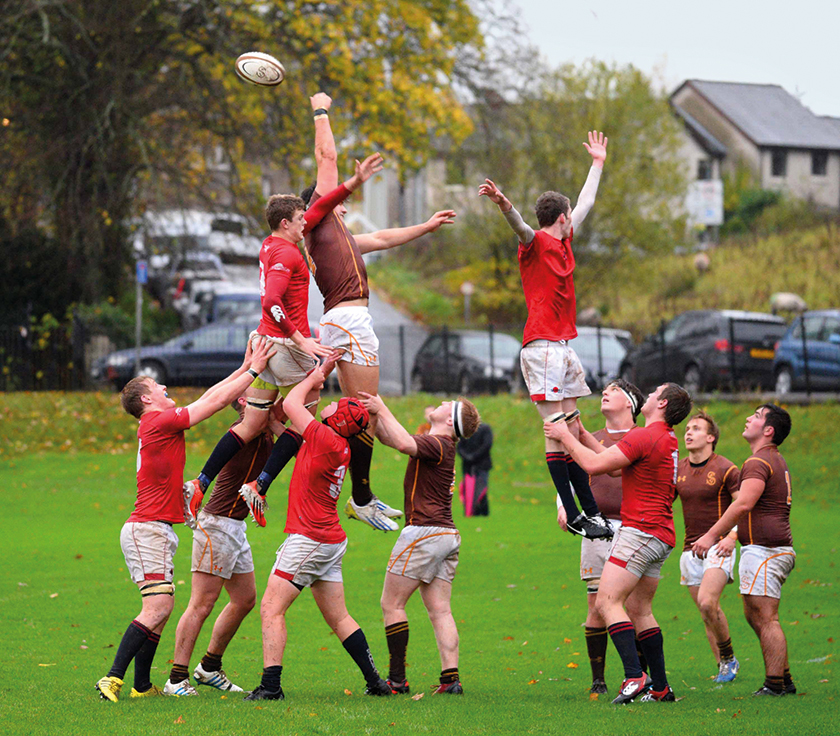
Sedbergh School
Shrewsbury, alma mater of England batsman, James Taylor, also has an outstanding tradition in athletics and football. Two of its alumni helped establish the rules of association football in 1856 and its cross-country team, The Hunt, is the oldest running club in the world. The squad, mentored by Kenyan great John Ngugi, win numerous national titles and even train at altitude in Ethiopia and Kenya during the winter.
Best Independent Schools for Tennis
Reed’s School, Cobham, alma mater of Tim Henman, St George’s College, Weybridge, and Queenswood School, Hertfordshire, each boast superb tennis facilities and scholarships that attract some of the best young players in Europe.
For schools competing hard to recruit top talent – sporting and academic – success on the games field is a potent shop window and attracts clusters of gifted youngsters, often on generous scholarships. For those who make it big in football, cricket, athletics and rugby, the financial rewards are huge. The world of sports management, media and marketing is also a lucrative, fast-growing business, so the incentives to succeed as a competitor, promoter, pundit or media executive are stronger than ever. Read more about tennis in schools here.
Sports Boarding Schools in the UK
Major boarding schools like Millfield, Tonbridge and Wellington dominate the sporting production line, thanks to the time devoted to team and individual practice, high quality coaching, organisation and facilities, plus a large quota of able, ambitious students egging each other on to achieve in a culture of friendly rivalry and professionalism.
For David Faulkner, Millfield’s director of sport, the school’s investment in coaching and development is key. ‘It’s down to what we put around the individual,’ he explained, ‘the total focus on technical, tactical, physical and mental provision, from sports psychology and nutrition to video feedback and fitness.
‘The academic side is equally important as many of our youngsters achieve sports scholarships to top US and British universities that can offer life-changing opportunities. Last year, two of our hockey players involved in the England age group programme, Olivia Allen and Torzie Boyland – both 19, won scholarships to Harvard where they’re doing brilliantly, maintaining a superb balance of work and sport and reflecting Millfield’s ethos of students striving to be the best they can be.’
Whitgift’s director of sport, Alistair Osborne, agrees that the school’s role is far wider than simply producing successful teams and individuals. ‘We do a range of sports to a high level and get a huge number of our 1,450 boys involved,’ he said. ‘Over 90 per cent of our Year 7s represent the school at different sports. We specialise in rugby, hockey, cricket and football and unusually for an independent school, have several boys in the Chelsea and Crystal Palace academies each year aiming to become professional footballers.’
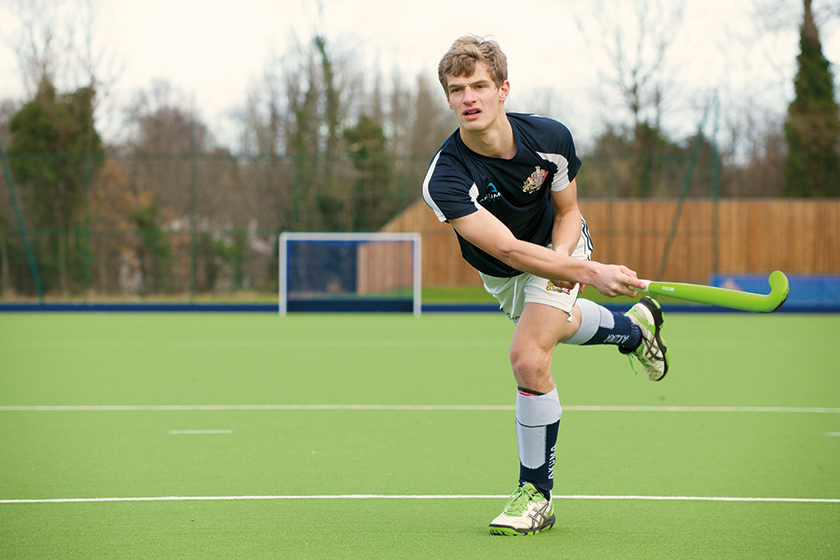
King Edward’s School, Birmingham
John Claughton, chief master of the high-flying King Edward’s School, Birmingham, and himself an Old Edwardian, has first-hand experience of sport’s benefits. A former Warwickshire cricketer, he achieved four cricket Blues and a double first in Classics at Oxford, and his sons are following in his footsteps.
James is playing hockey for Exeter University in the prestigious National League and Tom is winning Oxford Blues in both cricket and hockey. The school, which boasts Leicester and England rugby star Miles Benjamin and cricketer Mark Wagh among its alumni, is renowned for its water polo and hockey but titles and trophies are only part of the story.
‘With the growing stresses of academic work, we are seeing the value of sport as not only a release but a chance to enjoy yourself outside lessons,’ explains Mr Claughton. ‘It helps develop teamwork and leadership. I look at the older lads playing in the university sides with my sons. They have very busy lives and their CVs prove they can manage their time well, communicate and multi-task, which really boosts their employability.’
For Dan Clark, director of sport at picturesque Bradfield College, learning to cope with setbacks is an important part of the school’s success. ‘We have outstanding facilities: glorious grounds, great pitches and a nine-hole golf course. We’ve even built an indoor “swing room” for golfers to perfect their swing.
‘To me, though, the transferable skills our students gain from high-level sport are just as important: dealing with failure through developing resilience and learning to bounce back, as well as discipline from regular training and respect for other people. All these are applicable to business and the world of work and produce fully rounded human beings.’
Eton Fives
Several of the traditional public schools proudly retain the tradition of taking part in esoteric sports played in just a handful of schools and clubs. Eton, Shrewsbury, and Repton are among those which play the ancient game of Eton Fives, while Rugby and St Paul’s at Hammersmith both play a rather simpler variant known as Rugby Fives. Winchester College has its own version with different rules, called Winchester Fives. And then there are the distinctive ‘one-offs’. These are the games played only at the school that invented them, usually in eye-wateringly muddy conditions, such as Prince Harry’s choice, the Wall Game, the Field Game (both Eton), Harrow football, favoured by Churchill and King Hussein of Jordan, plus Winchester College Football (known as Winkies), in which ‘raising a plant’ (blocking a punted ball with your chest) was once considered ideal for building moral fibre.
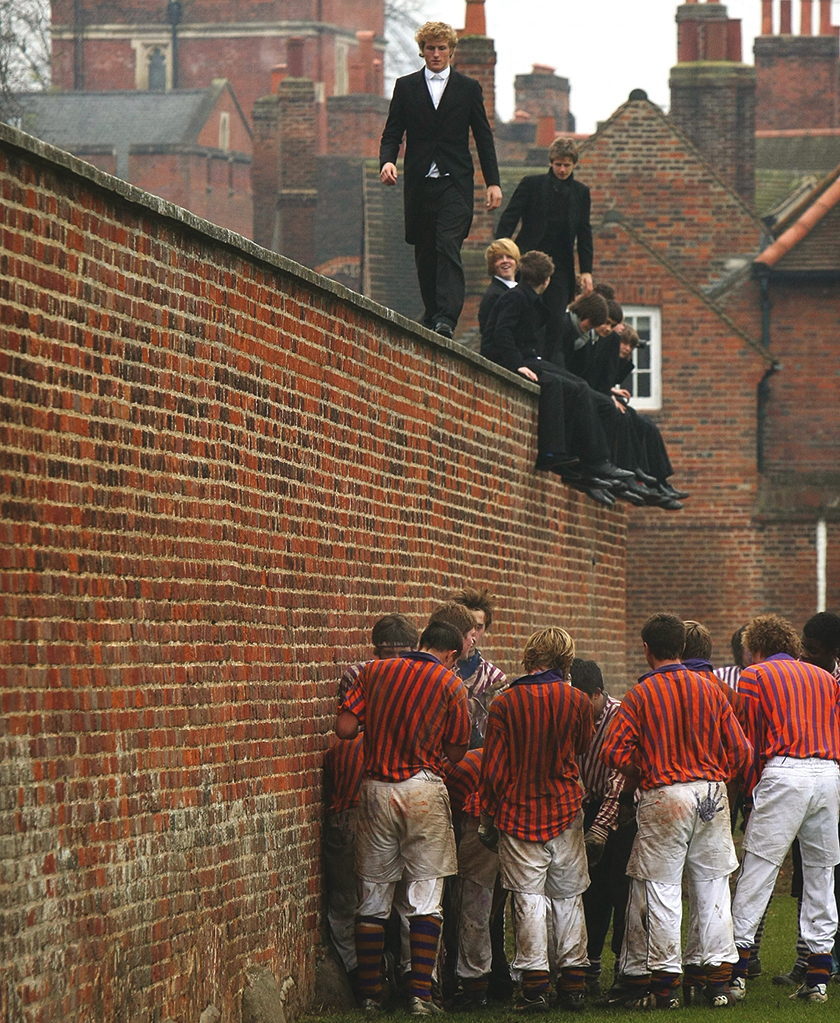
(Photo by Christopher Furlong/Getty Images)
With such a close-knit community of enthusiasts, these quirky pursuits often forge lifelong friendships. Who can forget those who have spent happy afternoons ‘knuckling’ or grinding your face with roughened gloves in the Wall Game, or accompanied you to matron with concussion from heading the huge, sodden Harrow ball? Rackets, the explosive forerunner of squash, started as a gambling game in the 18th-century debtors’ prisons and spread to the public schools. Fourteen schools still play it, including Cheltenham, St Paul’s, Tonbridge and Eton, where Oscar-winner Eddie Redmayne was a talented exponent. Although once considered far too fast and dangerous for women, Malvern College, Clifton, Wellington and Haileybury have dominated the recently introduced girls’ events after Malvern staged the first national women’s doubles championship in 2010.
Canford, Radley, Clifton and The Oratory School, Berkshire have their own real tennis courts and others, including Warwick School, Dulwich, Sherborne and Eton, offer it as an option. Like rackets, its quirkiness and perceived exclusivity can bring career benefits.
‘It definitely helps your CV,’ admits former Oratory sports director Jonathan Howell, a real tennis professional who mentored the Earl of Wessex. ‘Many well-connected people in the city and the professions play it. It’s a complex sport and the kids who play are often slightly eccentric with plenty of oomph. We play matches against senior sides from Lord’s and Queen’s Club; the kids meet their adult opponents in a relaxed atmosphere. Sometimes seniors say, “What are you doing when you leave school? Why not give us a ring”.’
Finding the Top Independent Schools for Sport for Your Children
So whether a youngster is aiming for a career in professional cricket or football, aspires to play county netball or simply enjoys milling about in their school’s third rowing eight or toning up with aerobics or badminton sessions, sport in the independent schools has something for everyone. The best provide generous scholarships, international-standard training and elite performance pathways to help their stars achieve on the world stage.
For the journeymen too, the benefits are invaluable. Even the least sporty types get the chance to try a range of different sports, any one of which could prove a joy for life. One friend’s highly intelligent but frankly clumsy and uncoordinated daughter won an academic scholarship to Millfield, discovered an unlikely passion for netball and trained doggedly with the school squad in a specialist shooting position. Her dedication paid off: her team won the national schools championship – and she achieved a coveted place at Cambridge, a huge boost to her confidence and her job prospects. Mens sana in corpore sano and all that.



